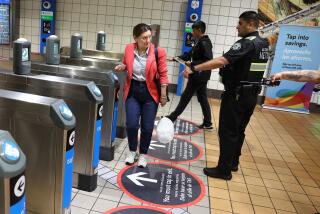MTA Drivers Feel the Pinch of 3 Weeks Without a Payday
- Share via
As day 21 of the punishing transit strike came and went Friday, some drivers said they were depending increasingly on food banks and scrambling to make house and rent payments, sometimes unsuccessfully.
At the Metropolitan Transportation Authority’s bus yard at 6th Street and Central Avenue in downtown Los Angeles, driver Peter Bueras Jr., 32, said he is giving up his home and maybe his car.
Bueras, who has six children under 10, said, “I am going to move back in with my parents, my wife is going to move back in with her parents to cut the costs.”
As for his car, Bueras said, “I am going to end up selling it before I lose it.” But Bueras said he will do whatever it takes to win the strike.
Mario Garcia, 54, walking beside Bueras on the picket line, said he already has missed a house payment.
“I have called my mortgage company that I am on strike and that I can’t get my payment this month,” said Bueras, who is eligible for up to $600 a month in strike benefits. He and other drivers also said they have begun depending on a food bank.
“We are going to stay here as long as it takes so we can get a fair contract,” Garcia said.
James Williams, leader of the 4,400-member United Transportation Union, arrived hours late at the Pasadena Hilton on Friday evening to resume negotiations. Asked by reporters where he had been, he said, “I have to do other things than negotiate here.
“I have to make sure there is some money for them this weekend,” Williams said, referring to strike benefits. “I have to make sure there is food. I made sure the food banks are going to be open next week.”
With negotiators on both sides worn out after a week of rallies, news conferences and on-again, off-again talks, negotiations were at such a standstill that MTA chief Julian Burke described the situation as “Square Minus 1.”
“It doesn’t look to me like any progress has been made,” Burke said during a break in talks that ended early Friday.
The drivers and mechanics are bargaining over work rules, pay, benefits, overtime and the length of workdays.
On another front, labor problems that once appeared to threaten Metrolink seemed less intense than previously reported.
Metrolink Strike Preparations Denied
John F. Harren, secretary-treasurer of Teamsters Local 986, sent a letter to David Solow, chief executive officer of Metrolink, disavowing comments by Teamster organizer Don Thornsburg that mechanics servicing Metrolink trains were preparing a strike.
The negotiations involve a new contract the Teamsters are hammering out on behalf of the mechanics, whom they agreed to represent earlier this year. The mechanics work for Bombardier, a Canadian company with a contract to service Metrolink trains.
“The ongoing negotiations have been positive; no strike vote has been taken or even contemplated, no sanction has been filed for with any other union entity,” Harren wrote.
Friday marked the first payday that strikers have missed. They received paychecks two weeks ago, for work completed before the strike.
The strike, already the longest in 21 years, will become the third-longest in MTA history if it lasts through the weekend, as appears likely.
The longest strike, against the MTA’s predecessor agency, the Southern California Rapid Transit District, lasted 68 days in 1974.
On Friday, bus yards that normally are busy with the coming and going of some of the 2,000 buses the MTA runs on an average weekday were eerily silent, as they have been since the strike began.
In the San Fernando Valley, about 20 drivers kept vigil outside Chatsworth’s Division 8 MTA yard Friday morning, vowing that they were in it for the long haul.
“We’ve decided we’re not going to let the company break us,” said 35-year veteran driver Bob Riccio.
Another in the group was Les Vance, 53, an entry-level driver who said he makes $10 per hour and does not get paid during the split times that have become the strike’s central issue.
The way Vance sees it, the union has compromised enough over the years. “We gave them part-time drivers because they said they were in financial trouble,” he said. “We gave them a week’s vacation back, because they said they had financial trouble. Now they say they still need more money? No way.”
Vance has worked for the MTA for only 11 months, but he worked from 1969 to 1992 as a driver for the transit agency’s predecessor, the RTD. Both he and Riccio, 60, remember the bitter RTD strike of 1974, which they said drivers waged at great personal financial cost.
“That was the last big strike I saw, and I saw people lose their homes,” Vance said. “But we’re going to stick this out. We think it’s worth it.”
The scene outside the bus yard bore Vance out: Union members have installed a large barbecue, wooden pallets to fuel it, a recreational vehicle stocked with cases of coffee creamer and other pickets’ supplies, and even a crate of vinyl records that strikers listen to on an old phonograph.
*
Times correspondent Richard Fausset contributed to this story.
More to Read
Sign up for Essential California
The most important California stories and recommendations in your inbox every morning.
You may occasionally receive promotional content from the Los Angeles Times.














